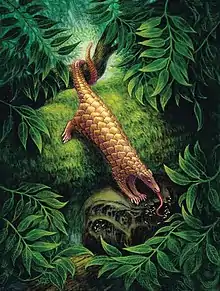Patriomanis
Patriomanis ("father of pangolins") is an extinct genus of pangolin from extinct family Patriomanidae. It lived during the Eocene of North America and it currently represents the only pangolin known from the Western Hemisphere. The genus contains one species, P. americana, which is known from six specimens, mostly from the Chadronian White River Formation of Montana. It had long digits and a prehensile tail, suggesting that it was arboreal, and its jaw was capable of opening wider than modern pangolins. Its ears and the hair between its scales were also longer than modern pangolins.[2]
| Patriomanis | |
|---|---|
 | |
| Scientific classification | |
| Kingdom: | Animalia |
| Phylum: | Chordata |
| Class: | Mammalia |
| Order: | Pholidota |
| Suborder: | Eupholidota |
| Superfamily: | Manoidea |
| Family: | †Patriomanidae |
| Genus: | †Patriomanis Emry, 1970 |
| Type species | |
| Patriomanis americana Emry, 1970[1] | |
| Synonyms | |
|
P. americana:
| |
Phylogeny
Phylogenetic position of genus Patriomanis within family Patriomanidae.[3][4]
| Pholidotamorpha |
| |||||||||||||||||||||||||||||||||||||||||||||
(Pholidota sensu lato) |
References
- R. J. Emry. (1970.) "A North American Oligocene pangolin and other additions to the Pholidota." Bulletin of the American Museum of Natural History 142(6)
- Gaudin, T. J.; Emry, R. J.; Morris, J. (2016). "Skeletal anatomy of the North American pangolin Patriomanis americana (Mammalia, Pholidota) from the Latest Eocene of Wyoming (USA)". Smithsonian Contributions to Paleobiology (98): vii-102. doi:10.5479/si.1943-6688.98.
- Gaudin, Timothy (2009). "The Phylogeny of Living and Extinct Pangolins (Mammalia, Pholidota) and Associated Taxa: A Morphology Based Analysis" (PDF). Journal of Mammalian Evolution. Heidelberg, Germany: Springer Science+Business Media. 16 (4): 235–305. doi:10.1007/s10914-009-9119-9. S2CID 1773698.
- Kondrashov, Peter; Agadjanian, Alexandre K. (2012). "A nearly complete skeleton of Ernanodon (Mammalia, Palaeanodonta) from Mongolia: morphofunctional analysis". Journal of Vertebrate Paleontology. 32 (5): 983–1001. doi:10.1080/02724634.2012.694319. ISSN 0272-4634. S2CID 86059673.
This article is issued from Wikipedia. The text is licensed under Creative Commons - Attribution - Sharealike. Additional terms may apply for the media files.